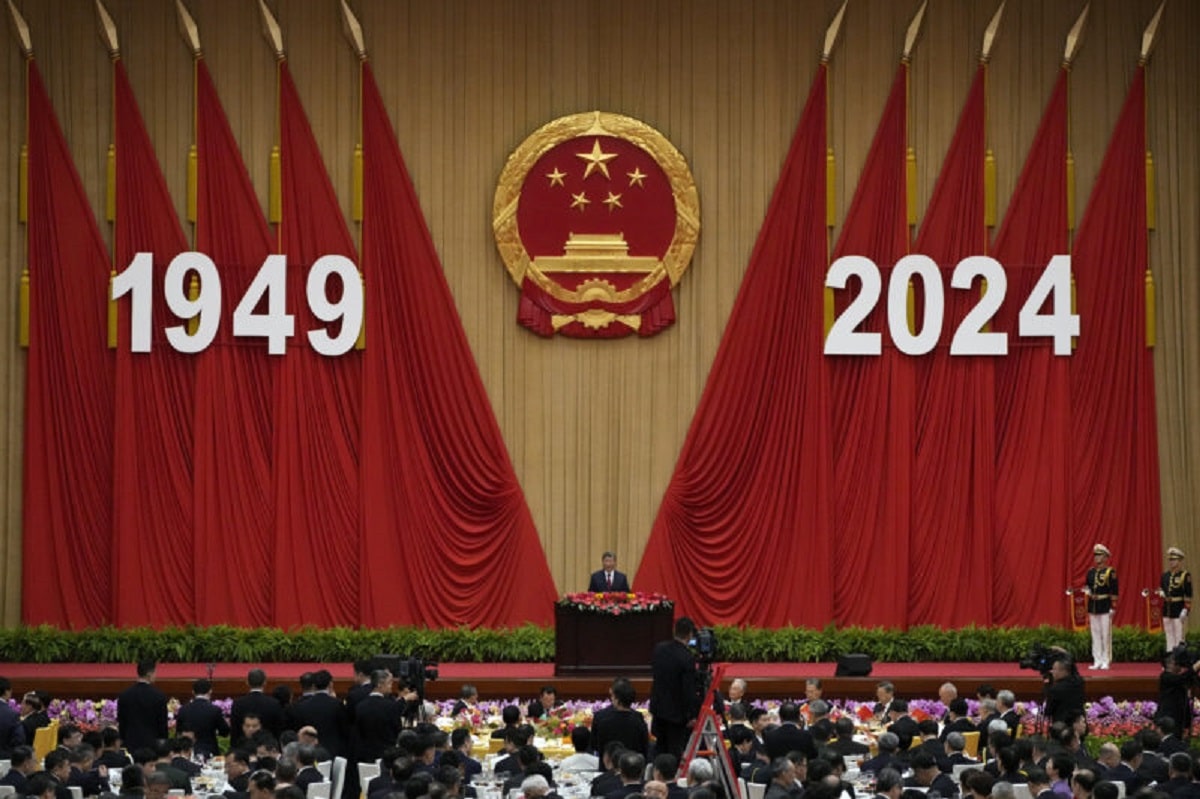
Chinese President Xi Jinping delivers his speech at a dinner marking the 75th anniversary of the founding of the People’s Republic of China, at the Great Hall of the People in Beijing, Sept. 30, 2024. —AP
MANILA, Philippines — The Communist Party of China (CPC), also known as the Chinese Communist Party (CCP), is the founding and ruling political party of the People’s Republic of China (PROC).
According to the official party history, the CPC led the fight to overthrow “the rule of imperialism, feudalism, and bureaucratic capitalism” beginning in 1921 up to the establishment of the PROC in 1949.
Under the CPC’s leadership, China transitioned to socialism, achieving large-scale socialist construction and economic and cultural progress unparalleled in the nation’s history.
Since its founding, the CPC has maintained a political monopoly and has been instrumental in the country’s rapid economic growth and rise as a global power. It represents the development trend of China’s “advanced productive forces,” “advanced culture,” and the “fundamental interests of the vast majority of the Chinese people” (aka The Three Represents).
Its ideological foundation includes Marxism-Leninism, Mao Zedong Thought, Deng Xiaoping Theory, and the important thoughts of the Three Represents as its “guide to action.”
Every five years, the CPC holds the National Party Congress to set major policies and select top leaders. During this time, members elect the Central Committee, a body of around 370 leaders, including ministers, provincial heads, and military officers. This committee acts like a board of directors for the party.
Since 2012, Xi Jinping has consolidated control over the party, emerging as the most influential Chinese leader since Mao Zedong. Xi holds China’s top roles as CPC general secretary, as well as China’s head of state as president and the head of the military. His power primarily stems from his role as general secretary because of how China’s political system works: party institutions and state institutions are technically separate, but the ultimate power comes from the CPC.
China’s military, the People’s Liberation Army, is technically the armed wing of the CPC, and its main objective is to protect the party’s rule and interests.
CPC membership is open to Chinese citizens aged 18 and above, including workers, farmers, military personnel, intellectuals, and other key societal figures. To join, applicants must accept the CPC’s Program and Constitution, actively engage in party activities, follow its decisions, and pay regular dues. The application process includes endorsements by two full members, approval from the party branch and higher organizations, and a one-year probationary period before full membership is granted.
As of 2021, the CPC has over 96 million members, with more than 70 percent being men, though female membership has grown in recent years.
The party has also seen growth in members with college degrees and those under 40. Agricultural and blue-collar workers make up roughly 30 percent of the membership.
The CPC has come under sustained criticism from the United States in recent years.
An October 2022 article published by the Council on Foreign Relations, an American think tank, summed up its view of the party at the time and how its policy direction had raised international tensions:
“In the early 2000s, Chinese leaders sought to assuage foreign governments by emphasizing China’s “peaceful rise.” But Xi has taken a more assertive approach, and some experts expect that his confidence will only grow during his third term. He has championed a vision for China to become a “fully developed, rich and powerful” nation with international influence by 2049. The CCP has worked to achieve this by modernizing its military, pursuing extensive land reclamation efforts on disputed islands in the South China Sea, investing billions of dollars in countries worldwide through its massive Belt and Road Initiative, and taking on a more active role in international institutions.”
“In response to China’s foreign policy assertiveness and domestic human rights abuses, the United States and other Western countries have sanctioned members of the CCP and expressed wariness to do business with China.” —Inquirer Research